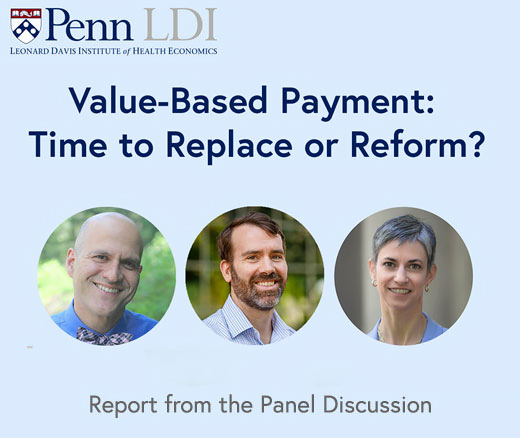
Medicare Payment Model Shortchanges Rural Patients, Study Finds
CMS’s Main Risk Adjustment Method Underestimates Rural Patients’ Health Risks, LDI Fellows Show, Potentially Reducing Access to Care in the Heartland
Health Care Payment and Financing
Blog Post

America’s mega hospital systems have grown for years, with medical centers merging into ever-larger entities. These systems now control more than 90% of all U.S. hospital beds, and sometimes stretch across many states that aren’t physically connected.
These mergers often come with two key promises for the areas they serve: lower health costs and better quality.
But are they true?
The claim of lower prices is a mirage, researchers say. Hospital mergers raise health costs, studies have shown over many years. Hospitals undertake mergers partly to improve pricing power with insurers.
Now the exhaustive searches have gone on long enough, say LDI Senior Fellows Mark Pauly and Lawton Robert Burns. Mergers are unlikely to improve quality, they say in a new paper in Social Science & Medicine, and regulators shouldn’t accept improved quality to justify a merger.
Regulators should be especially skeptical of horizontal mergers that reduce competition in a local market, Pauly and Burns say. If regulators must approve a merger, they should make it conditional on improving quality.
Here are more thoughts from Pauly and Burns:
Pauly and Burns: Not necessarily. Systems have dissolved and/or hospitals sold off, so consolidation is not a foregone conclusion. Plus, systems that span many markets (like a religious system in many different states) are less of an issue than horizontal consolidation within markets. Even here, except for the largest 10 metropolitan areas, most local markets are consolidated to some extent. The defense of a horizontal merger—that it will improve quality even if it pushes up price—was our target in this article, and that defense is still being offered. That defense is wrong.
Pauly and Burns: The quality defense for a merger is not supported by theory or evidence. The only sure thing is that a merger will result in higher prices for the merged hospitals, not improved quality. We argue that this non-result is to be expected, since a firm that gains more pricing power through a merger will not find it profitable to improve quality at the same time, even if it could.
Pauly and Burns: Researchers have diligently looked for changes in quality following mergers. Quality can be measured by mortality rates (in hospital or soon after a hospitalization), absence of complications, responses on satisfaction surveys, or other ways. None of these metrics improve after a merger, and in some cases, they worsen. It is hard to prove what you cannot find, but our summary of the research on this subject is that there is no rigorous evidence to support the claims for increased quality following a merger, and some circumstantial evidence that quality gets worse.
Pauly and Burns: The best case for quality improvement, we argue, is if greater firm size after a merger lowers the cost of improving quality. One way of doing that is if higher volumes allow producers to be more experienced in how to produce improved outcomes—practice makes perfect. However, this will only happen if the merged firm distributes larger output among a smaller number of physicians or facilities, and yet that often does not happen; the hospital does not reduce the size of the medical staff after merger or the number of sites of care. Another way to improve quality is through use of more nursing care per patient, but this is also not an observed consequence of mergers. Still, a third way is for positive peer advice to physicians to improve their decision-making. Although a merger may lead to an expansion of the peer network for physicians, there is no evidence that this improves quality. Finally, and most obviously, quality improves if physician diagnostic certainty and accuracy improve—but mergers do nothing to change that.
Pauly and Burns: The primary recommendation is that promises of improved quality should not be accepted as justification for consolidation that would otherwise reduce competition. Improved quality is very unlikely to happen. The paper is not intended to be an exhaustive analysis of other ways to improve quality, but the main implication is that higher volumes per provider that promote learning by doing, and better nurse staffing and work environment (if they were made conditions of merger approval), might be desirable.
Pauly and Burns: As noted in the paper, it is hard to measure quality in an objective and non-manipulable way. Medicare uses some metrics mostly as ways to cut reimbursement and punish low quality. If there were some metric, one would first need to determine the value of improvements in that metric (say, in terms of mortality reduction or quality of life improvement), value it in money, and then add that amount or a little less as a bonus for hospitals able to accomplish them.
Pauly and Burns: Here is some advice: (1) treat nonprofit mergers the same as for-profit mergers. There is no evidence that ownership form makes a difference for hospitals; (2) say no to horizontal mergers that reduce competition in local markets; and (3) if you must approve a merger, make it conditional on improvement in quality goals or the merger will be unwound.
Pauly and Burns: Everyone would agree that there needs to be better objective measures of quality (see above) but so far no one has found a robust set. Experimenting with payment for quality may be worthwhile. Some employers or insurers have tried to assemble networks of providers based on quality as well as cost—evaluate them.
The article, “Hospital Consolidation and Quality: Opening the Behavioral Black Box”, was published September 14, 2025 in Social Science & Medicine. Authors include Mark V. Pauly, Lawton Robert Burns, Alejandra Benitez, and Michael Sielski.


CMS’s Main Risk Adjustment Method Underestimates Rural Patients’ Health Risks, LDI Fellows Show, Potentially Reducing Access to Care in the Heartland

Penn LDI Debates the Pros and Cons of Payment Reform

Moving from Fee-for-Service to Risk-Based Contracts Hasn’t Dramatically Changed Patient Care, Raising Questions About How to Make These Models More Effective

Government Regulatory Power Wanes as Power Accrues to Courts and Corporations

The Wharton Professor Produces a Compendium of Economics Wisdom for Health Care Pros

Medicare Advantage Modestly Cut Black–White Disparities in Chronic Disease Prevention Compared to Traditional Medicare, but Care Gaps Remain for Latinx Populations